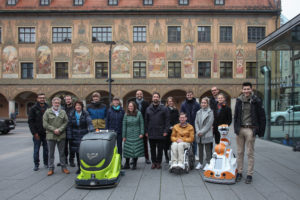In the coming years, service robots/assistant robots will increasingly be able to take over tasks such as cleaning and transport in public spaces, e.g. in pedestrian zones, public squares, railway stations and parking garages. This means they will not only become part of the cityscape, but work processes will change. The encounters of uninvolved persons with these robots will thus increase in everyday life. Therefore, in order to be able to perform their task efficiently and safely, the robots must interact not only with their human team partners, but also with these uninvolved passers-by. This includes, for example, communicating their task and coordinating path planning. The Ulm Centre for Research and Evaluation of Human-Robot Interaction in Public Spaces (ZEN-MRI) will deal intensively with these and other questions in the coming years. To this end, the University of Ulm, Stuttgart Media University, the Fraunhofer Institute for Industrial Engineering IAO, Adlatus Robotics GmbH and the City of Ulm have joined forces in a cooperation project.
Over the next three years, the partners will develop the necessary requirements for robot behaviour and interaction strategies (MRI) for the public Ram. The research focus is on interactions with passers-by to optimise robot behaviour, but also on embedding the robots in public space. To this end, test areas will be set up in public spaces in Ulm’s city centre. Among other things, areas are planned in the pedestrian zone and in the Bahnhofspassage, where encounters will then be possible in people’s everyday lives. Legal and ethical questions will thus become just as important an element of the investigations as design, safety requirements and questions of urban planning specifications.
The project is funded by the Federal Ministry of Education and Research with a total of 3.6 million € for the period 01.09.2022 – 31.08.2025. The project work was officially launched with the kick-off event held on Thursday, 03.11.2022 at the M25 information centre in Ulm city centre.
Dr Johannes Kraus (University of Ulm, Department of Human Factors, Topic Leader Human-Robot Interaction):
“When designing robots that move in public spaces, it is crucial that the people around you understand what the robots do and when, and ultimately feel comfortable with them. Against this background, we are researching the psychology of interaction between humans and robots, among other things, at the ZEN-MRI competence centre. The goal here is to contribute to designing the appearance and behaviour of robots in a way that reduces irrational fears and creates an appropriate level of trust. Such a human-centred design of robots maximises the chance that a safe, efficient and for people and society positive integration of robots in public space will succeed.”
Dr Siegfried Hochdorfer (ADLATUS Robotics GmbH, CTO):
“ADLATUS Robotics has been developing, producing and distributing autonomous cleaning robots for the B2B market since 2017. The first generation of robots was mainly developed for use in industrial and commercial environments. The latest generation of robots is designed in such a way that it can also be used in public spaces. For the acceptance of autonomous cleaning robots like ADLATUS Robotics, the interaction with humans is of central importance. That is why ADLATUS Robotics has been involved in research on human-robot interaction for several years.”
Kathrin Pollmann (Fraunhofer Institute for Industrial Engineering IAO, User Experience Team):
“The success of a service robot is ultimately not decided by its technical equipment, but by the people. In order for the robots to be accepted and used with pleasure in the long term, their use must be pleasant and profitable for all involved – in short: positive.”
Prof. Dr Petra Grimm, Prof. Dr Tobias Keber (Stuttgart Media University, Institute for Digital Ethics):
“The use of robotics in social environments and thus environments not yet optimised for robot use is always associated with ethical and legal questions. For example, how can robots “learn” ethical principles of action? With our Ethics-by-Design approach, we at the Institute for Digital Ethics (IDE) therefore accompany development and design processes of autonomous systems in a cooperative way: Digital ethics and law should not prevent innovative technology design. Rather, their opportunities should be uncovered by considering risks and potential conflicts from the very beginning.”
Lord Mayor Gunter Czisch (City of Ulm):
“Ulm is a city of innovation and on its way to becoming a smart city. Robotics is a focal point in the scientific and economic landscape of our region. This technology must become “tangible” for people. We promote real contact with new technologies that have become indispensable in our everyday lives. Thank you to the funders for making such a hands-on encounter and exposure of the citizenry to this forward-thinking technology possible in our city centre.”

